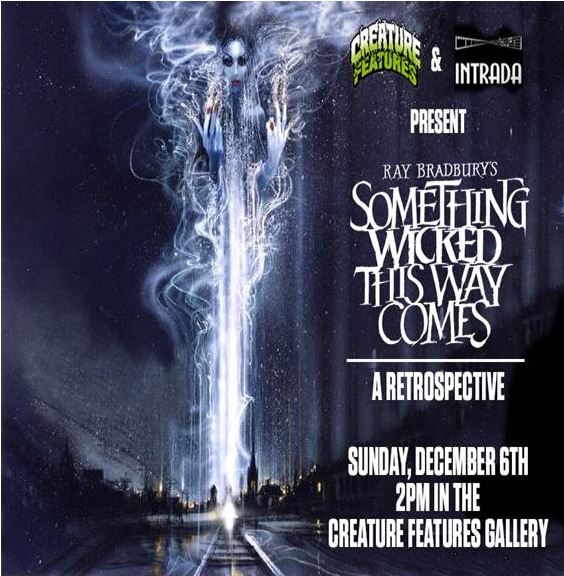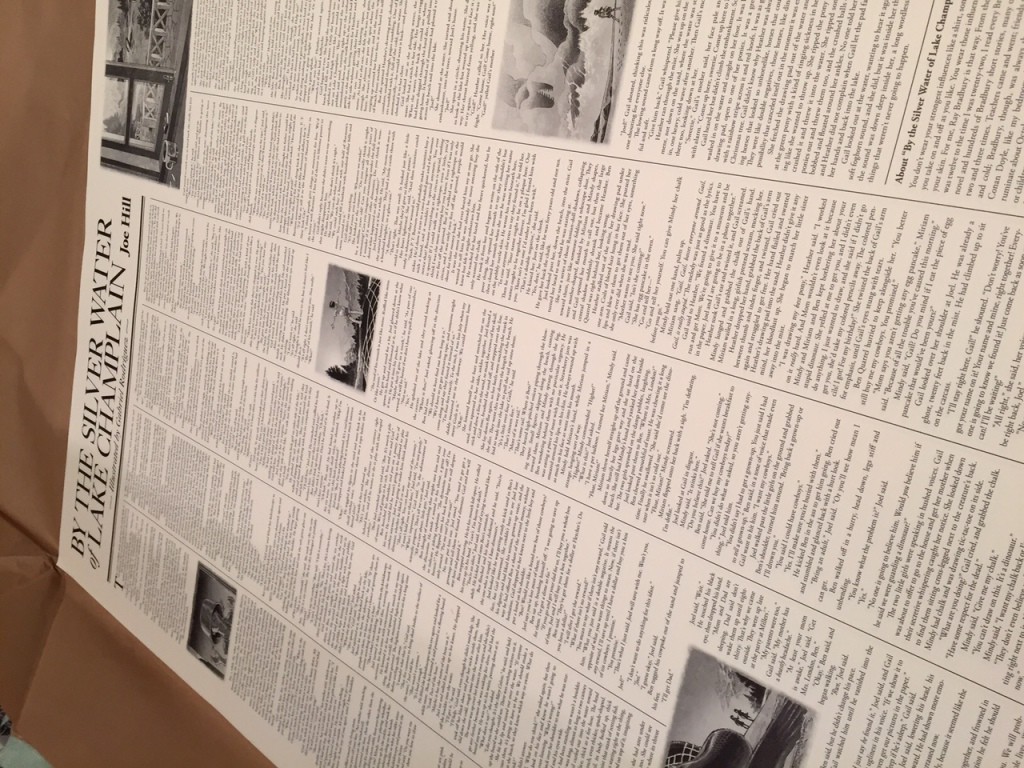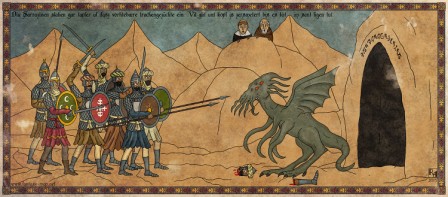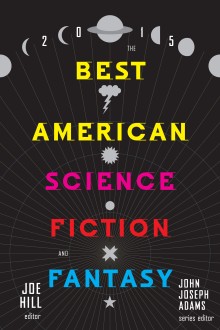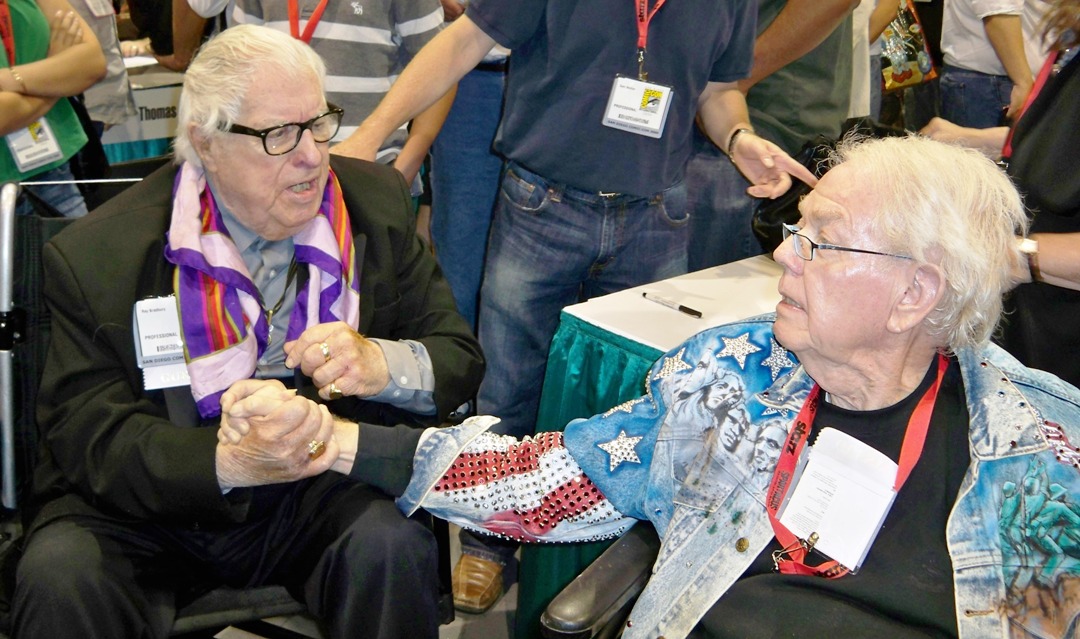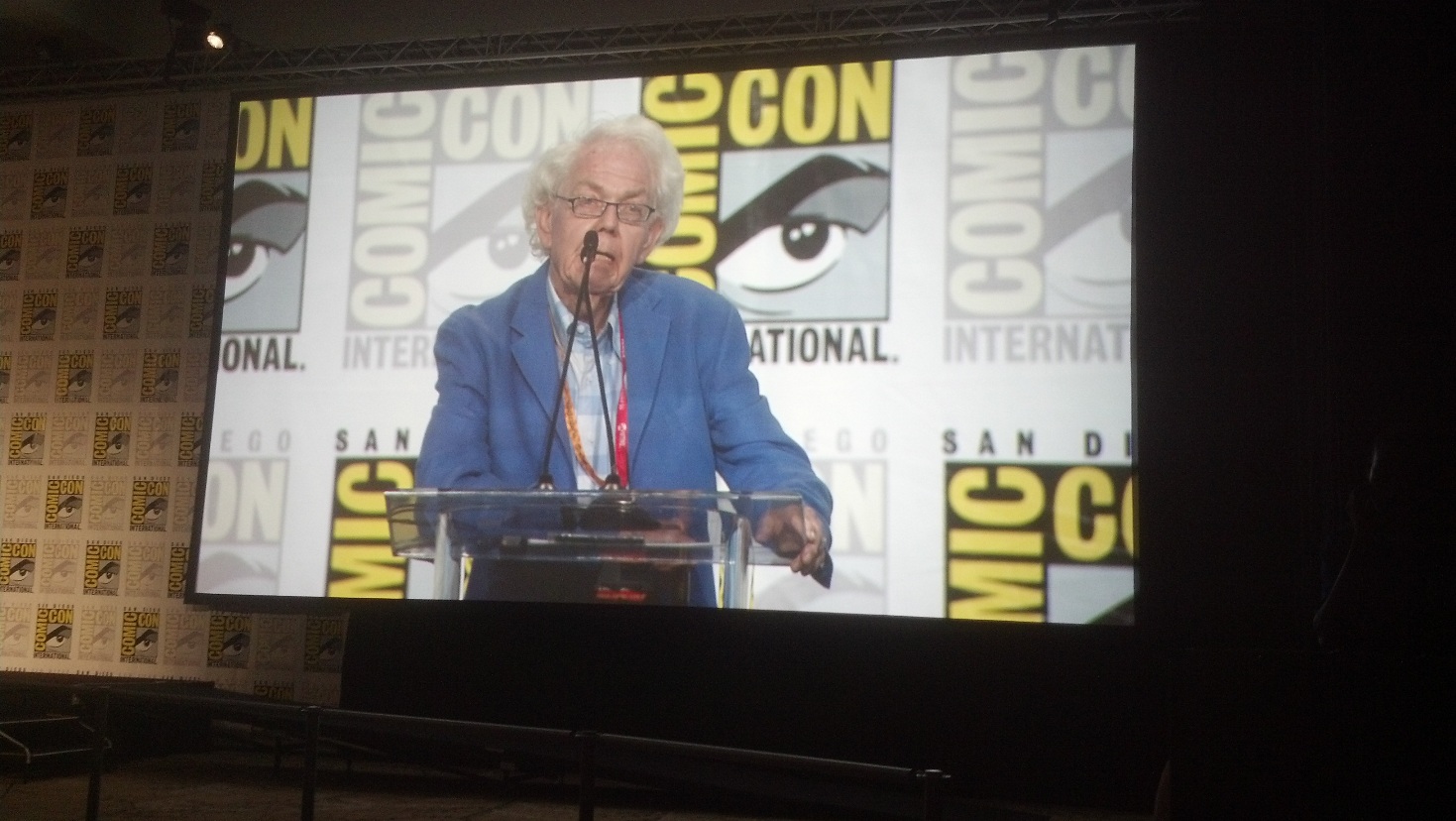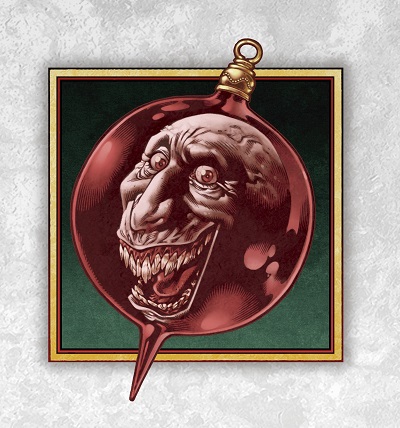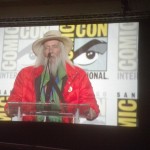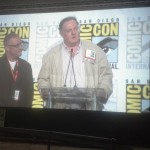What European writers call the Hugo Awards “hack” is getting international coverage. Today’s roundup features quotes from Polish and German articles… or as close as Google Translate can get.
There are geniuses who are mad, writers who are mad, and fans who are mad. No wonder there’s also a psychologist trying to analyze the Sad Puppies phenomenon. And if that doesn’t work, someone else has done a statistical analysis.
One writer thinks so many are alarmed by the controversy she needs to volunteer as a bodyguard —
Vonda McIntyre on Book View Cafe
“I will walk with you” – April 15
I’m distressed to see that some folks who were planning to come to Sasquan are thinking of skipping Worldcon this year.
Because they’re frightened.
I understand why people are frightened, given the racist, misogynistic, and dishonest screeds they’ve been subjected to. It isn’t — alas — unusual for verbal abuse to escalate into physical abuse; and anyway verbal abuse is no fun to begin with.
But I was thinking about what might help counterbalance the situation….
I will walk with you at Worldcon.
I’m not very fond of confrontation. I’m a courtesy 5’1? and my 67th birthday (how did that happen?!) is just after the convention and I’m walking with a hiking pole while recovering from a hiking fall, an injury that’s taking way longer to heal than when I was a pup.
On the other hand I’m a shodan in Aikido.
On the third hand, which I can have because I’m an SF writer, shodan — first degree black belt — is when you realize how much you still have to learn.
But I’m thinking that maybe it would make folks who feel threatened feel a little safer to have someone at their side, maybe even someone with a bunch o’ fancy ribbons fluttering from her name badge, even if that person is shorter, smaller, and older than they are, white-haired and not physically prepossessing. It’s another person’s presence.
Lou Antonelli on This Way to Texas
Two more scalps – April 16
Yesterday two people who previously didn’t mind having their names on the list and who are Hugo nominated decided withdraw the names. They are both young and probably afraid theircareers will be hurt. Quite frankly, I think it’s a futile gesture. Their flirtation with deviancy will never be forgiven by the SF establishment.
Jason V Brock on Facebook – April 15
I feel sympathy for those trapped in the scenario who did nothing wrong, yet are suffering the consequences, when they should be able to enjoy themselves.
Additionally, people who take a side against someone should reconsider from the perspective of the folks that have been honored justly, and who do good work. In other words, there are people who have toiled for years building a reputation and then have the misfortune of an angry person/group trying to exact revenge, or tarnish everything (out of jealousy, I’d say, and a warped sense of reality). It’s not fair to block or unfriend people that genuinely did nothing but stand up and say “But I didn’t do anything bad.” These are the actions of cowards. People need to have cooler heads and try to understand things better.
Alastair Reynolds on Approaching Pavonis Mons by balloon
“On the present Hugo mess and while I still want one” – April 15
The odd thing is – or perhaps it isn’t odd at all – is that the ongoing trouble with the Puppies only makes me feel more warmly disposed to the Hugos. I certainly should have voted. It would have taken a lot more of us to outweigh the block voting effect of the slate ballot, but that’s no argument not to have tried. As I’ve mentioned earlier, I’ve been striving to read a lot more short fiction this year, and I already feel a lot better informed about the state of the field in 2015 than in recent years. And yes, while the Hugo award has been damaged – it’s hard to see a way around that, irrespective of what happens later in the summer – I would still like to win one eventually. I hope the award can weather this storm, and continue on as it should be – a prized part of SF’s collective heritage.
Marcin Zwierzchowski on Geek Blog (Polish)
“Nagrody fantastyczne jest problem” – April 8
[Google Translate from Polish to English] The latter is the nail in the coffin of awards plebiscite. This year, it hit a huge force in Hugo, where most nominations seized authors connected with the movement Sad Puppies. The initiators of action rightly pointed out that in recent years, this prestigious award has become a mouthpiece through which the environment was manifest on the strength of its tolerance and diversity. Instead, the text of the loudest discussed whether the nominees and the winners are more women or men, whether it is enough ethnic minorities, whether they are homosexual, etc., Etc.
Der Standard
“Was George R.R. Martin zum rechten ‘Hack’ der Hugo Awards sagt” – April 16
[Google Translate from German to English] In the past, it managed to get individual groups to influence the nomination lists on their behalf: Be it the followers of Scientology -Gründers and (often forgotten) SF-author L. Ron Hubbard. Be it the well-organized fandom of “Doctor Who”, which manages year after year in the short film category, to give the impression that there is nothing price worthier throughout the film, television and web video world as the British endless series. But such initiatives were always based on individual works – there has never been such a comprehensive campaign, moreover, an ideological background.
George R. R. Martin on Not A Blog
“On the Darkling Plain” – April 15
My friend Janice Gelb, long time worldcon volunteer and SMOF, has suggested that the only thing we can do at this point is abolish the Hugo Awards altogether. When I first heard that notion, I dismissed it out of hand. Some good will, some civility, a mutual exchange of ideas, and surely we could find a way to salvage the situation.
I am no longer convinced of that. The Sad Puppies are digging in and doubling down, and so is worldcon fandom. Meanwhile, off in the cesspools, the Rabid Puppies grow ever more rabid. Nuclear options are being seriously considered, and Vox Day has apparently threatened that if NO AWARD wins in any category, he will see to it that no award is ever given in that category again.
My first inclination was to dismiss that threat as so much toxic wind. But I am not so sure. According to FILE 770 https://file770.com/?p=21877 there have been 1352 new Supporting Memberships purchased this month, an unprecedented number. Very few of these purchases, I fear, were motivated by a sincere desire to support WorldCon. No, all these new supporting members are plonking down their money for a vote on the Hugos.
Ah, but which side do they represent? Are these members of traditional fandom, signing up to take back their awards? Are these Sad Puppy supporters, anxious to vote their slate to victory? Are these all NO AWARDers? Or maybe these are the Vox Day fans. Beale seems to have much more control over his followers than Correia and Torgensen do over theirs… the ballot actually has more Rabid Puppies than Sad ones. Could it be that Vox Day has successfully roused the GamerGate bogeyman that he was been threatening us with? No one knows. Unless…
I think it is All of the Above.
And as for me… I don’t know right now. On odd numbered days, I lean toward opting out of SasQuan entirely. Stay home, work on the book, I don’t need this grief. On even numbered days, I am determined to go… and to go BIG. Take the Hugo Losers Party back. I started it, after all. And this year, so far as the Hugos are concerned, we are all going to be losers.
George R. R. Martin on Not A Blog
“Joining Sasquan” – April 16
I have been going to Worldcons for a long time. My icon is a picture of me at Torcon II, the 1973 Worldcon in Toronto, where I lost the very first John W. Campbell Award for Best New Writer. Wasn’t I cute? It was my second Worldcon, following on Noreascon I in Boston in 1971. (I missed LA in 1972).
Brandon Morse on EveryJoe
“Exclusive Interview With Sad Puppies’ Brad Torgersen” – April 16
EJ: In a blog post, Doctor Who critical historian Philip Sandifer recently said that “the moral duty of progressive voices to form a blocking majority, and to loudly admit that fandom as it stands is broken, and that any work proclaimed to be the best of the year by a fandom this broken is demeaned by the association.” Do you think the outrage against Sad Puppies is ultimately because you broke the “blocking majority” that Progressives feel is their moral duty to maintain?
Torgersen: I feel like this is very much about totems. I wrote a long article today, talking about tribalism, and how Worldcon Fandom has reacted to having outside tribe(s) coming to “take away” the totem that is the Hugo Award. We’re committing near-sacrilege when we do that. But the chief problem is that the Hugos self-label as being the award for everybody while Worldcon wants to keep the total deciding process internal to itself; no out-tribe people allowed. An award for all, decided by the few. That’s the core of the problem. So, if the progressives feel a duty to keep out-tribe people from participating, I feel a duty to put a hand to their faces and say, “No, you don’t get to decide who is and is not a fan, or who is and is not worthy.”
Maureen O’Danu on Am I The Only One Dancing
“The Psychology of Hugo Sad Puppies and Rabid Puppies” – April 16
Larry Correia’s public attitude makes it pretty clear that he felt that he deserved to win and that the Hugo he was nominated for was stolen from him, rather than simply won by another contender. (Larry denies this verbally, but one of the first rules of psychology is that when there is a conflict between words and actions, believe the actions.) The subjective nature of literary awards makes this a not uncommon problem. In any award where winning is at least partially a matter of opinion instead of mathematics, the language of robbery holds sway. “He was robbed” “She stole that award” “How on earth did he take that away from her.” From ice dancing to dressage to debate to writing, any ranked creative competition is going to generate these sorts of claims.
Correia took this further, speculating on the basis of negative comments he had received from either fans or writers (he has never specified) that he was specifically denied his award because of his political views. He has said that he believes has been specifically denied because he owns a gun store, is Mormon, is conservative, or all or some combination of the above.
It is common for people who feel entitled to look for unjust reasons for exclusion from something they feel they are owed. Afraid to look within, they will search for any confirmations they can find that someone, somewhere has unjust views of them, and then work long and hard to build a case that these views somehow formed the basis of discrimination. The logical leaps and sifting for scant evidence that make up this process are the roots of paranoid beliefs and are pretty common among lots of people, not just people who have diagnoses.
Nathaniel Givens on Difficult Run
“Some Sad Puppy Data Analysis” – April 14
If the last chart depicted clearly the reasons why social justice warriors are so opposed to SP / RP, this chart depicts clearly the reasons why SP came into being in the first place. What it shows is the average Goodreads review for the Hugo best novel winners (in red) and nominees (in blue) for every year going back to the first Hugo awards awarded in 1953.8 The most interesting aspect of the chart, from the standpoint of understanding where SP is coming from, is the fairly extreme gap between the scores of the nominees and the winners in the last few years, with the nominees showing much higher scores than the winners. Here it is again, with the data points in question circled:
Let me be clear about what I think this shows. It does not show that the last few Hugo awards are flawed or that recent Hugo winners have been undeserving. There is no law written anywhere that says that average Goodreads score is the objective measure of quality. That is not my point. All those data points show is that there has been a significant difference of opinion between the Hugo voters who picked the winners and the popular opinion. What’s more, they shows that this gap is a relatively recent phenomenon. Go back 10 or 20 years and the winners tend to cluster near the top of the nominees, showing that the Hugo voting process and the Goodreads audience were more or less in tune. But starting a few years ago, a chasm suddenly opens up….
Closing Thoughts
I still think that Sad Puppies have a legitimate point. Their goal was to get a few new faces out there who otherwise wouldn’t have been considered. I think that’s an admirable goal, and I think that there are some folks on the ballot today who (1) deserve to be there and (2) wouldn’t ever have gotten there without Sad Puppies. And I know that even some of the critics of SP3 agree with that assessment (because they told me so).
Eric Flint
“Some comments on the Hugos and other SF awards” – April 16
[A very long and multifaceted post – this is just the first paragraph.]
I’ve been doing my best to stay away from the current ruckus over the Hugo Awards, but it’s now spread widely enough that it’s spilled onto my Facebook page, and it’s bound to splatter on me elsewhere as well. It’s also been brought to my attention that Breitbart’s very well-trafficked web site—never famous for the accuracy of its so-called “reporting”—has me listed as one of the supposedly downtrodden conservative and/or libertarian authors oppressed by the SF establishment. Given my lifelong advocacy of socialism—and I was no armchair Marxist either, but committed twenty-five years of my life to being an activist in the industrial trade unions—I find that quite amusing.
Ian Randal Strock
“Foolishly jumping into the Hugo mishegas” – April 16
So, to bring this back to the Hugo Awards: we have something which a significant number of people value. And it’s something that has a set of operating instructions, which can be followed and gamed. Now, after sixty years of giving out Hugo Awards, some of the voters have realized that acting in concert gives them power within the system, and the Puppies Party has been born and instantly proven its viability.
Many people who are not part of the Puppies Party are decrying their actions, rending their garb, declaiming their love for the Hugos, and announcing their hatred for those people who would dare to “hijack” the award with concerted effort. The Puppies Party appears to have issued an ultimatum that they will keep doing what they’ve done in the future; I don’t doubt they can (I do doubt the value of doing it, but not the ability to do it).
So, to those opposed to the Puppies Party, I can only say: welcome to party politics. If you don’t like what they’ve done, you have a few choices:
1. You can do away with the Hugo Awards, simply retire them as a concept.
2. You can change the rules to make party politics impossible (though off the top of my head, I can’t see an easy way to do so).
3. You can embrace the not-so-modern paradigm and form your own political party.
You can hate the concept of politics within the “purity” of the Hugo Awards, but now that a party has been formed and started operation, complaining about its existence will be a futile exercise. The Puppies Party has the power of unity that those who oppose it don’t yet have. So, who among you is going to step up and start the conversation to form your party?
And for our European viewers, none of this thinking is to deny the validity of the parliamentary system. Perhaps the Hugo Awards may evolve into a multi-party system. Although the awards, as winner-take-all prizes, do tend to lend themselves more to a two-party system.
Larry Correia on Monster Hunter Nation
“I’m not Vox Day” – April 16
I cannot disown what I do not own.
I neither condone nor defend any of his public statements. I did not make them.
Of course I do not like some of the things he has said.
Do you think the existence of Rabid Puppies has somehow made my life easier?
I’m not going to burn anyone in effigy. Stop asking.
I’m not going to condemn anyone by association. Stop asking.
Brad R. Torgersen
“Sad Puppies: We are not Rabid Puppies” – April 16
I’ll state it again for emphasis: we are not Rabid. None of us wants to burn the Hugos down. We want the Hugos to live up their reputation as the preeminent award in the combined field of Science Fiction & Fantasy. We want Worldcon to be an actually diverse thing with authors and fans participating from across the spectrum, without having to worry about litmus tests or being in the correct groups. We don’t want people to have to be chameleons who hide who they are — or what they like or what they create — because it’s not what the “cool kids” agree with.
The objectives of Sad Puppies 3 have been simple and consistent:
- Use the democratic selection system of the Hugo awards.
- No “quiet” logrolling. Make it transparent.
- Boost authors, editors, and works — regardless of political persuasion.
- Bring recognition to people who’ve been long overlooked.
- Get some good promotion for new folks coming up in the field.
- Have fun!
Kate Paulk on Mad Genius Club
“There Hugo Again” – April 6
Claiming that being nominated because people who agree with Vox Day or Larry Correia or Brad Torgerson, or any other person you care to mention voted for their works is some kind of horrible taint is beyond the pale. The more of that kind of totalitarian secret police tactic that’s used, the more I want to stand up and shout, “I am Vox Day.” Or “I am Larry Correia.” Or… you get the point.
Because we are all Vox Day. Or Larry Correia. Or Brad Torgerson. Or anyone else who dares to disagree with the opinions of the would-be power-brokers. If we are not, then Oceania has always been at war with Eastasia, Freedom is Slavery, and two plus two equals five.
Sanford Begley on Otherwhere Gazette
“I’m sick and tired of the Hugos”
I’m a 57 year old politically disgusted heterosexual male. I can more or less claim white. Family stories say there are a few other things in there, but none particularly show so, who cares? Now that you know I have privilege you can dismiss me and move on to a more diverse writer. Or stay if you aren’t a bigot. I’m good either way.
Miguel on Gun Free Zone
“The Hugo Awards, Social Justice Warriors and Sad Puppies” – April 16
Oh dear gods of the pantheon! You would have thought the Barbarians broke into the Vestal Temple and proceeded to rape the curtains and burn the Virgins. First came the accusations of ballot stuffing which went down in flames when it was pointed out that the rules for nominations were followed to a fault. Then it came the generalized accusations of “gaming the rules” to introduce a “Conservative, all-male heterosexual, redneck, icky” slate which died under quick examination of the slate as it was actually more varied in every concept than previous Hugo nominations. Then it came to be that the works were not true SciFi/Fantasy or did not conform to what SciFi should be, but somebody just pointed out that previously nominated works like If You Were A Dinosaur My Love and the whole cookie went down in crumbs.
But something was puzzling the SJW clique: After all the attacks, the Sad Puppies not only were not cowed, they had the balls of actually laugh at them! How dare they! So they went even stupider attacking individual authors. Larry Correia is an official White Anglo-Saxon Supremacist (I reckon that you will find the Portuguese last name in the Mayflower list), death threats were issued which is funny as hell when Larry is the size of a shoggoth, knocked down cows for fun a-lo-Mongo in his youth and is a firearms instructor with possibly more guns and ammo in his basement than many police forces in rural America…and some urban areas too.
Alan Davis on LewRockwell.com
“Science Fiction – The Culture War’s Line in the Sand” – April 16
Why is science fiction–as a book genre–dying, while simultaneously conquering Hollywood, television, and video games?
Over the last twenty or thirty years, the science fiction publishing industry has changed. Now, all of the major publishers, save one, take the political viewpoints of writers into account before publishing their works. And if that writer happens to be libertarian, or conservative, or holds any views that don’t mesh neatly with the left-wing attitudes of the editors and publishers, then the only publisher willing to read their material is Baen. Political correctness has become the key to science fiction, so excellent writers who don’t fit the mold are almost completely excluded from publishing and awards.
Ty Burr on Boston Globe
“Trouble brews in the world of sci-fi writing” – April 16
What’s at the bottom of the Sad Puppy complaint? Exclusion, it turns out. Responding to Martin’s comments, Correia blogged of his own memories of being a youthful sci-fi outcast at the Worldcon party: “The cool kids told their cool stories to the other cool kids, and lorded it over those who weren’t part of the In Joke. Honestly, it reminded me of high school, and I was the poor fat kid who had inadvertently pissed off the mean girls.” To which Martin responded, “Surely you have been around fandom long enough to realize that there are no cool kids. We’re all the fat kids, the nerds, the computer geeks, the guys who always had their nose in a book, who loved comics and played chess and couldn’t get a date for a prom.”
This isn’t really about right versus left, in other words, but feeling like you belong. And while there’s a productive conversation to be had when the volume is kept low, the voices on the sidelines, anonymous and otherwise, just pour gasoline on the flames.
More and more, I’m convinced that the Internet is toxic.
The only thing to do, I think — and I’m talking about more than just the Sad Puppies and Gamergate — is to marginalize the crazies on both sides. Which means, in practice, marginalizing the crazies on your side. We have to start making a stand for a big, sane middle and allowing everyone on the spectrum of that middle to express emotions without going on the attack. Anyone who calls names, responds from anger, hate, or fear — block them. Ignore them. Do not feed the trolls.
Jason Sanford
On screaming “We’re not VD!” while ignoring your relationship with VD – April 16
I don’t need Larry and Brad or anyone else to say they’re not Vox Day. I know that. Everyone knows VD is responsible for his own actions and statements.
But what many people suspect is that Larry and Brad worked with VD on all this. And based on the evidence, it’s difficult to draw any other conclusion.
For example, Brad ran this year’s Sad Puppies campaign and posted their voting slate on February 1. I can’t tell you the exact time he posted the slate, but the first comment on the post appeared at 8:40 pm, followed quickly by many more.
Vox Day posted his Rabid Puppies ballot on February 2nd. Again, I don’t know the exact time but the comments began coming in a little after 1 am. Depending on the time zone settings of these two sites, that means as little as a few hours separated the posting of the Sad and Rabid Puppies slates.
But hey, let’s be generous and say an entire day separated the launch of their “separate” campaigns. If there was no coordination between the two campaigns that means in less than a day VD read all the stories on the Sad Puppies slate, decided which to discard and which to add to his own slate, and launched his campaign.
Oh, and he also found time to contact the artist who created the Sad Puppies logo and have that artist create a similar but different logo for the Rabid Puppies. (The artist is Lee Madison, who uses the name Artracoon on his art. He even set up a site to sell shirts with both Sad and Rabid Puppies logos.)
If it’s possible to do all that in such a short time frame without coordinating the two campaigns, I’d love to hear how it was done.
Another Hugo Proposal:
Three Hugos for the Mil-SF and their space marines,
Seven for the grimdark-lords in their halls of blood,
Nine for Mortal Fans doomed to blog,…
One for Neil Gaiman on his dark throne
In the Land of Worldcon where the Shadows lie.
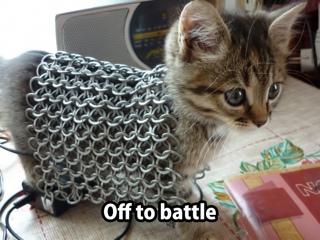
Hugo Justice Warriors If some Puppy has been calling you an SJW lately, maybe you’d rather identify yourself as a Hugo Justice Warrior. Click through to see our noble shield on a variety of products.
Proudly stand up to the enemies of fair play and quality SF&F by flaunting our shield. The Latin motto means “I will fear no puppies.” either sad or rabid. I’m sure Heinlein, a man of principle, would have approved.
Considering the merchandise is being marketed to fans, one of the funniest parts is that T-shirts only go up to 3X….

